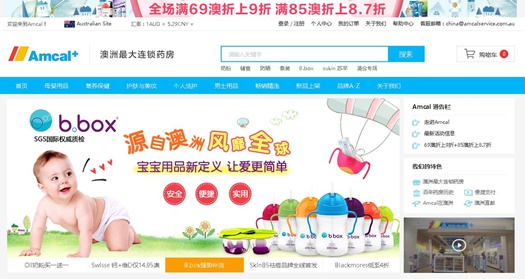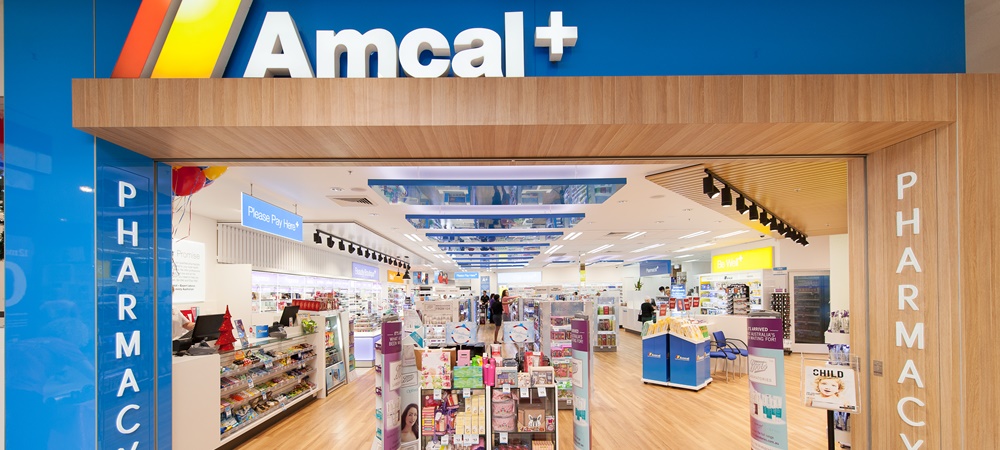It’s no secret that many Chinese consumers are eager to purchase Australian products. So eager that the ‘daigou’ market has flourished here in recent years, with entrepreneurs capitalising on demand for items like baby formula and vitamins by purchasing products from Australian stores and shipping them to buyers in China for an often inflated price.
While some Australian brands have simply watched this unfold, others have chosen to bypass the middlemen and go straight to consumers by starting their own operations in China.
Retail pharmacy chain Amcal, owned by Sigma Healthcare, launched into the Chinese market last year after noticing strong demand for its products. Not only were customers shopping in Australian Amcal stores and taking products back to China, but suppliers were approaching Amcal for help selling into Asia.
Claire Pallot, general manager of multi-channel for Sigma, told Retailbiz that Amcal’s suppliers were seeing a big demand in China and fulfilling it, but wanted to consolidate who they were dealing with from a quality and price perspective.
Rather than ease into China by selling on a marketplace like Alibaba’s Taobao, Amcal decided to go direct to consumers through a standalone ecommerce site. This decision proved to be the right one and Pallot said she was amazed at how fast the brand took off.

Amcal’s Chinese site.
“I was surprised at how quickly we were able to scale. We found that within the first month we had a huge following. For us it was initially all about acquiring new customers and now we’re all about keeping existing customers.”
Launching with a standalone site was a considered decision that meant the company could offer products outside the restrictions of a marketplace.
“We wanted to build the brand in its own right to start with,” said Pallot. “Chinese consumers are motivated by high-quality products and we thought they would purchase outside just the formula and vitamin range. In order to [sell a wider range of products] we had to build a standalone site.
“We are carving a niche as a full pharmacy offer. In time we will potentially use a marketplace to strengthen and broaden awareness of the brand.”
A major factor in Amcal’s success thus far has been the Chinese perception that Australian goods are ‘safe’. Big sellers for the company have been Aerogard insect repellents, mother and baby products, and personal care including feminine hygiene.
“Sun cream is also a very good example of why Chinese consumers purchase from an Australian retailer,” said Pallot. “In Australia sun cream is governed by the TGA [Therapeutic Goods Administration], so the controls and checks and balances behind the quality of sun cream in Australia is much higher than in other countries.”
Amcal China: different channels, same mechanics
As an Australian chain with no expertise in China, Amcal partnered with a digital agency in order to enter the market and grow. However Pallota noted that while the channels consumers and brands use in China are different to those in Australia, “the mechanics are the same”.
“The fundamentals around customer service and delivery are consistent in both [Australia and China]. It’s about working out which channels are used in the market.”
The customer demographics Amcal targets in China are also very similar to those in Australia—mainly women—but the way they shop is different, with a greater emphasis on mobile.
“Smartphone usage is huge, 92.4 per cent of phones bought in China are smartphones,” said Pallot. “And this isn’t just in tier one cities. Mobile penetration is huge.”

Because of the influence of social, some products become ‘hot’ overnight.
The prevalence of smartphones and high levels of social media usage have impacted Amcal’s strategy in ways they haven’t in Australia.
“In the Chinese market one of the strategies we use is offering ‘hot sellers’,” said Pallot. “Because of the influence of social, some products become ‘hot’ overnight. It’s a great way of acquiring new customers because everyone wants that product.
“As a wholesaler in Australia we’re not always very nimble, so we’re adapting our fulfilment model to bring in these hot products quickly and exit them quickly.”
Although China is a massive market to crack with an enormous number of retailers competing for customers, Pallot said she sees this the market size as an opportunity rather than a constraint.
“There are players going in to make a quick buck and then moving out and not delivering on service or quality,” she said. “Players that are actually there for a longer time want to invest in service, range [and] all the rest.
“This reduces the challenges of others coming in and out. It’s a slower burn but a big opportunity.”
Want the latest retail news delivered straight to your inbox? Click here to sign up to the weekly retailbiz newsletter.

